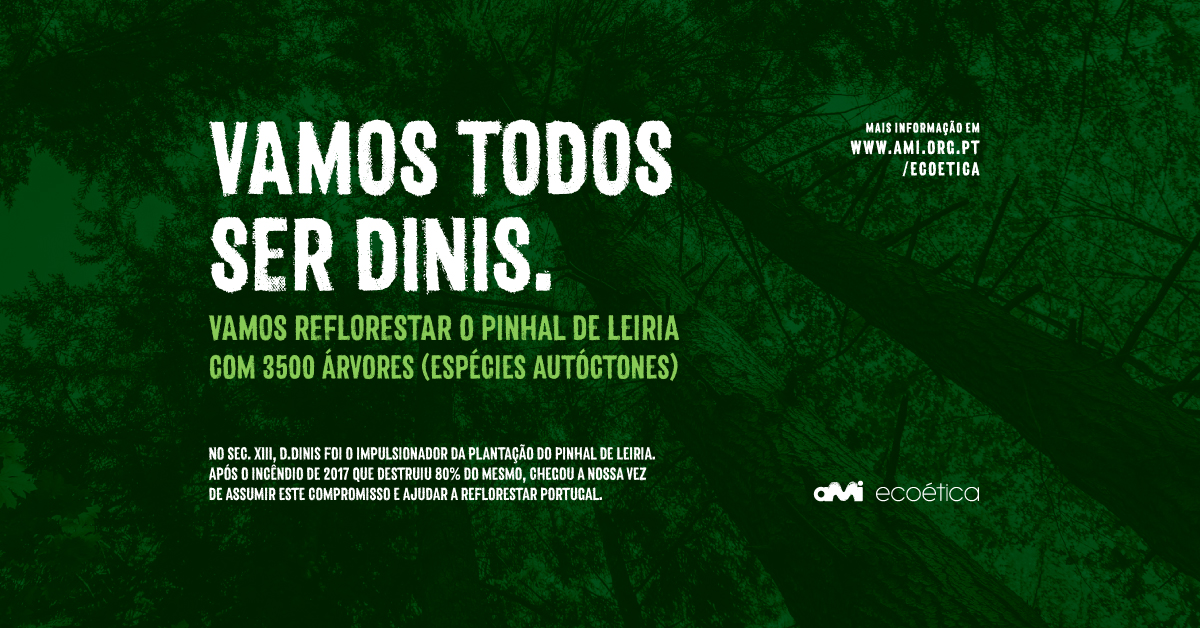
The Ecoética project was launched by AMI in April of 2011 with the objective of meeting the needs regarding conservation of nature and territorial planning in Portugal. This project includes actions of reforestation with native species, control of exotic species, fire prevention and requalification of fluvial areas. The Ecoética project aims to rehabilitate more than 1,000 hectares of abandoned, burnt or degraded land all over national territory, in partnership with forest associations and municipal councils and with the financing and involvement of businesses and citizens. The areas to be intervened are public or publicly managed and the actions are of an exclusively conservationist character, without any profit or commercial objective.
Its approach is totally innovative in Portugal in the process of allocating land to the participants, which is based on area of land and not on number of trees, thus leaving the actions to be developed dependent solely on scientific and technical criteria. In order to strengthen the relationship between the participants and the land under management, all land is georeferenced, with the geographical coordinates being included in the participation certificate. This procedure makes visiting and monitoring the sites easier, both during the intervention phases and throughout the different stages of development, growth and autonomization of the new forests.
How does it work?
The partnering forest associations establish protocols with city councils that transfer the land, select the arboretums that produce the plants used in the afforestation efforts, ensure the transport of the plants to the land, coordinate the afforestation tasks, and organize training actions for volunteers and participating entities. The most suitable species are defined depending on the characteristics, the propensity and the location of the land to be planted. For the list of lands intended for intervention in 2014, the following set of species was defined:
- Holm Oak (Quercus rotundifolia)
- Maple (Acer pseudoplatanus)
- Portuguese Oak (Quercus faginea)
- English Oak (Quercus robur)
- Chestnut (Castanea sativa)
- White poplar (Populus alba)
- Mexican White Cedar (Cupressus lusitanica)
- Narrow-leafed Ash (Fraxinus angustifolia)
- Strawberry Tree (Arbutus unedo)
- Cluster Pine (Pinus pinaster)
- Stone Pine (Pinus pinea)
- Scots Pine (Pinus sylvestris)
- Cork Oak (Quercus suber)
- European White Birch (Betula pubescens)
From March to mid-October:
Period of maintenance of forest areas – From March to June and from the end of September to the end of October only land is maintained. In July, August and September access to them is not allowed. This way, businesses will be able to participate in actions of nature conservation, taking advantage of them for teambuilding purposes. A proposal of organization of such an action will be presented to interested companies. There is a cost associated to these actions.
From mid-October to February:
Planting period – The participation of companies is made through a donation which includes the cost of the trees to be planted, their transportation, their maintenance for the next 20 years (including possible replanting if necessary) and a certificate of participation. If the company is interested in providing its employees with the opportunity to plant the trees themselves, and for this action to be effective, AMI proposes that this process be of a half-day duration. It should be noted that the amount paid for each 20m2 lot already includes all the preparation work, logistics (materials, insurance, technical follow-up, etc.) and the 20-year maintenance of trees planted. We emphasize that any action carried out within the scope of the Ecoética project is accompanied by forest technicians who closely follow all the intervention carried out by first responders and AMI teams. Preferably, the planting actions should take place between the end of October and February. More than 120,000 m2 of forest land located in Loures (Cabeço de Montachique Municipal Park), Lisbon (Monsanto Park), Melgaço and Celorico da Beira (Natural Park of Serra da Estrela), among others, have been financed, allocated and intervened. Up to now, several companies from different sectors and dozens of private citizens have participated in this project. The main benefits already achieved with its implementation are:
- Increase of native vegetation cover area in Portugal;
- Prevention of impacts associated with the introduction of invasive species;
- Soil preservation;
- Protection of groundwater reserves;
- Improvement of the environmental quality of the intervened areas;
- Maintenance of high conservation value areas;
- Promotion of rural tourism and nature;
- Promotion of education, citizenship and environmental responsibility.